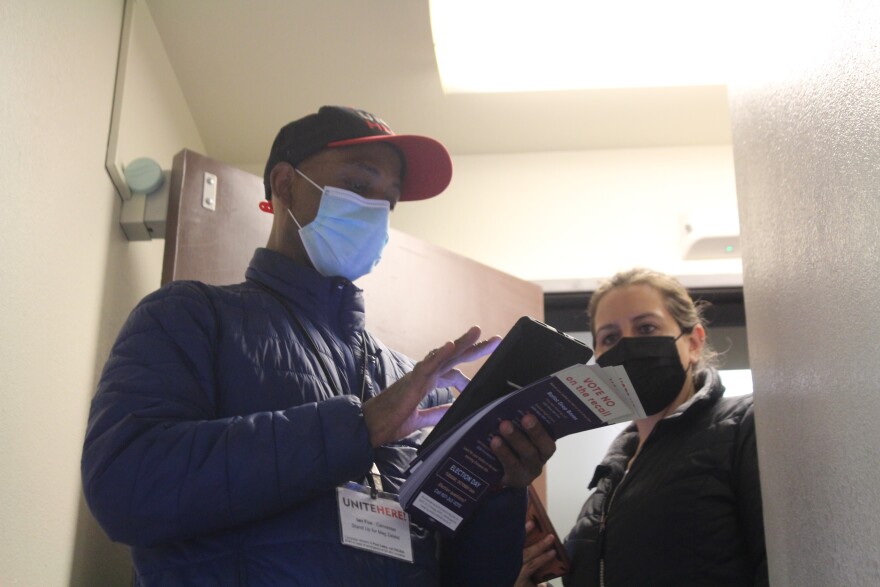In the final days of the campaign to recall Anchorage Assembly member Meg Zaletel, tens of thousands of dollars are pouring in to fund a sprint of door knocking, mailers and a barrage of online ads before voting closes on Tuesday.
Recall supporters say the race represents a rejection of what they see as wasteful spending of federal COVID-19 relief money that flaunted normal public process. Those who oppose recalling Zaletel say she's unfairly bearing the brunt of tough decisions to support COVID-19 mitigation measures like mask mandates, and that the health of Anchorage residents is at stake.
Regardless of which way the election goes, it’s unlikely to change the balance of the Assembly. That’s because even if the recall succeeds, the progressive Assembly will select a replacement until the regular election in April.
Still, to some observers, the cash going toward the recall — which is more than the campaign that got Zaletel elected in the first place — signifies something bigger: a deeply partisan political climate where people have starkly different views on the pandemic.
“I think there are more people on both sides of the political spectrum who are looking at recalls as just a way of irritating, annoying and distracting people in office that they disagree with,” said Jim Lottsfeldt, a political consultant who has worked in Alaska politics for decades, mostly for progressive candidates.
A campaign to recall Midtown Assembly member Felix Rivera, who is also progressive, failed in the April election. Another campaign is underway to try to unseat Jamie Allard, an outspoken conservative
It’s unclear what has caused the recent uptick in Assembly recall petitions. Ballotpedia,a crowdsourced website that tracks local elections, shows the recent recall attempts are the first for Assembly members in at least a decade.
Recall supporters say the campaign to unseat Zaletel, which is based on a minor rules violation at a meeting last fall, represents more than just unseating her.
Russell Biggs, who organized the recall, argues that Zaletel has ignored public process rules by pushing through the controversial purchase of a former hotel to use as a substance abuse treatment center. Last year, the Assembly purchased the building, near Biggs’ property in Geneva Woods, but Mayor Dave Bronson recently repurposed the building as a COVID-19 treatment center.
Biggs is also unhappy with how the Assembly has awarded federal COVID-19 relief and stimulus money.
“It's a very unique time in Anchorage history because
Biggs pointed to funding given to groups like the Alaska Black Caucus, a civil rights group that Biggs sees as political. He described that funding — which the group said it would use for COVID-19 vaccination and testing to create the first report on the health of Black Alaskans — as irresponsible. The $1.15 million grant for the group was approved at the request of then-Mayor Austin Quinn-Davidson and passed as part of a consent agenda, so it didn’t require a separate vote.
Biggs also criticized a $70,000 donation from the Unite Here union based in New York, which he sees as outsiders trying to influence the election.
Joelle Hall, president of the AFL-CIO, a labor organization, who’s leading the anti-recall campaign, said the donation was from the national umbrella union that has a local branch that’s actively opposing the recall. She’s not a fan of all the money funneling into the election, but said it’s a result of looser campaign finance laws over the last decade.
“People might lament that they wish this was like the olden days and maybe in the old days this didn't happen,” she said. “But it's not the old days.”
Pro-recall groups have had their share of large donations from local companies. Recall supporters got a $75,000 boost from a local paving company, a $15,000 from a property company, plus a handful of $5,000 donations from local contractors.
Those costs don’t take into account $98,000 of taxpayer money the Assembly approved to mail out and count up to 40,000 ballots.
There are also thousands of dollars the city spent after the clerk denied the recall petition, claiming that the stated reasons weren’t factually sufficient. The recall campaign appealed and the judge agreed, saying it wasn’t the court’s job to determine whether the grounds were factual. The ruling was based on a recent decision about the recall of Gov. Mike Dunleavy.
Biggs said the influx of Outside money makes him worried about whether his campaign will succeed. His campaign to unseat Felix Rivera lost substantially in April. But he said some benefits have come out of it, like more people, including himself, engaged more heavily in local politics.
“This kind of stuff makes me want to be an activist — I don't really I don't like using that word,” he said, “But, you know, I have zero political aspirations except to see people get a fair shake.”
Others, like political consultant Lottsfeldt, aren’t so optimistic.
“I'm not sure I view this as increase interest in local politics as much as I view this as just another proxy for this larger cultural war,” he said.
That won’t change, he said, until national leaders turn down the temperature in political debates.
Correction: This story previously misidentified what type of group the AFL-CIO is. It is a labor organization, not a union.

